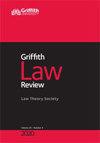Introduction to the Griffith Law Review Commission of Inquiry special issue
IF 0.9
Q1 LAW
引用次数: 0
Abstract
These introductory remarks outline the themes and articles that comprise this special issue of the Griffith Law Review on ‘Commissions of Inquiry’. The guest editors explain how the work collected in this issue draws on a rich interdisciplinary scholarship and critical analysis to reveal both the prospects as well as limitations of such inquiries. The articles tackle issues ranging from banking and finance capitalism, to child sexual abuse; as well as First Nations’ experiences of imprisonment, deaths in custody and settler colonial violence; and international Truth and Reconciliation Commissions. In late 2020, Victoria’s First Peoples’ Assembly won Government support for a First Nations truth and justice commission. One of the early observations by Professor Gregory Phillips, a Waanyi-Jaru man, was the need for a genuine truth-telling process alongside national healing and substantive justice. This is a sobering message and made with reference to the limits of the South African Truth and Reconciliation Commission, especially in relation to its failure to deliver on justice. All too often, commissions of inquiry and truth-telling processes have good intentions but are hamstrung by legal and bureaucratic requirements and a lack of government will to follow-through with implementing the fullness of recommendations. By 2021, the failures of government to implement core recommendations of the Royal Commission into Aboriginal Deaths in Custody year have come to be regarded as contributing to the subsequent 474 First Nations deaths in custody. This special issue of Griffith Law Review on Commissions of Inquiry discusses the strengths and weaknesses of inquiries. At best, they enable stories of the marginalised and oppressed to be heard, heal and strengthen survivors and provide a mechanism for justice to be delivered. At worst, they are a decoy for government action and retraumatise survivors. The analyses of the inquiries examined in this collection demonstrate the need to learn from the successes and failures of commissions of inquiry of this kind. The articles convey the substantial scope for inquiries to provide more meaningful outcomes for survivors and public policy. To do this, those responsible for wrongs and crimes need to be held accountable. Yet rarely does this occur in adequate measure. This failure curtails the capacity of inquiries to make amends through reconciliation and格里菲斯法律审查委员会调查特刊简介
这些介绍性发言概述了格里菲斯法律评论“调查委员会”特刊的主题和文章。客座编辑解释了本期收集的作品是如何利用丰富的跨学科学术和批判性分析来揭示此类研究的前景和局限性的。这些文章涉及的问题从银行和金融资本主义到儿童性虐待;以及第一民族遭受监禁、拘留期间死亡和定居者殖民暴力的经历;以及国际真相与和解委员会。2020年末,维多利亚州第一人民议会赢得了政府对第一民族真相与司法委员会的支持。Waanyi Jaru人Gregory Phillips教授的早期观察结果之一是,在国家治愈和实质性正义的同时,需要一个真正的真相讲述过程。这是一个发人深省的信息,并提到南非真相与和解委员会的局限性,特别是在其未能伸张正义方面。调查委员会和真相讲述程序往往有良好的意图,但由于法律和官僚要求以及政府缺乏贯彻落实建议的意愿而受到阻碍。到2021年,政府未能落实皇家原住民在押死亡调查委员会的核心建议,已被视为导致474名原住民在押死亡的原因之一。本期《格里菲斯法律评论》调查委员会特刊讨论了调查的优势和劣势。充其量,它们能让被边缘化和被压迫者的故事被听到,治愈和加强幸存者,并为伸张正义提供机制。最坏的情况是,它们是政府行动的诱饵,并使幸存者再次受伤。对本汇编所审查的调查的分析表明,有必要从这类调查委员会的成功和失败中吸取教训。这些文章传达了大量的调查范围,为幸存者和公共政策提供更有意义的结果。要做到这一点,就需要追究那些对错误和罪行负有责任的人的责任。然而,这种情况很少发生。这一失败削弱了调查通过和解和
本文章由计算机程序翻译,如有差异,请以英文原文为准。
求助全文
约1分钟内获得全文
求助全文

 求助内容:
求助内容: 应助结果提醒方式:
应助结果提醒方式:


